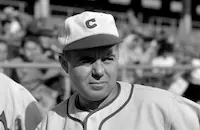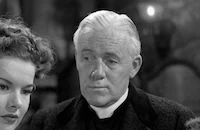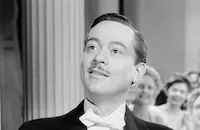Eve Knew Her Apples

Brief Synopsis
Cast & Crew
Will Jason
Ann Miller
William Wright
Robert Williams
Ray Walker
Charles D. Brown
Film Details
Technical Specs

Synopsis
After finishing an exhausting season as one of the top radio singers on the air, Eve Porter decides to take a vacation despite the protests of her press agent, Steve Ormand, and her manager, George McGrew, who have already committed her to a movie deal. Eve journeys to a summer resort, but when George and Steve arrive in search of her, she hides in an old automobile. The car belongs to newspaper reporter Ward Williams, who, unaware that Eve is hiding in his back seat, speeds away after a fight with his city editor, Joe Gordon. On the road, Ward is stopped by the highway patrol, who are looking for Edith Palmer, an escaped murderess who has the quaint habit of singing before she kills her intended victim. Later, upon discovering Eve burrowed in his back seat, Ward, believing that she is the murderess, drives to an auto court and assures her that he will help her escape. Seeing an opportunity for a scoop, Ward calls his editor to tell him that he has the singing murderess and will deliver her to the paper. Complications arise, however, when Ward begins to fall in love with Eve and experiences second thoughts about betraying her. Meanwhile, George and Eve's wealthy, middle-aged fiancé, Walter W. Walters II, decide to offer a $5,000 reward for her return. A traveling salesman who is a guest at the auto court sees the reward and offers to cut Ward in on the profits. Finally realizing Eve's true identity, Ward scares off the salesman by pretending to be a gangster. Ward feels dejected because Eve is engaged to someone else and offers to drive her to Hollywood. On the road west, they stop for the night at a farmhouse, and just before falling asleep, Ward confesses his love to Eve. The next morning, while Eve slumbers, Ward drives into the city and writes a story about his discovery of Eve and her forthcoming marriage. While Ward is gone, Eve is found by the farmer, who notifies Walter and George, who then hurry to the farm. Believing that Ward has deserted her, Eve insists upon marrying Walter that day. The story is printed in a competitor's paper and hits the press before Ward's story is published. Gordon is surprisingly sympathetic to Ward's plight and suggests that he assert himself and claim Eve as his bride. Although Eve is in love with Ward, she feels betrayed when she learns that Ward is coming to see George to collect the money that George owes him. Eve thinks that Ward is coming to collect the reward, but in reality, Ward only wants the thirty-five dollars that he spent on Eve. Aware that Eve does not love Walter, George informs her that Ward is not interested in the reward and urges her to marry him. Following George's advice, Eve takes Ward's arm, and together, they walk out of the wedding festivities.

Director

Will Jason
Cast

Ann Miller

William Wright
Robert Williams

Ray Walker

Charles D. Brown

John Eldredge
Eddie Bruce
Betty Hill
Jessie Arnold
Boyd Davis
Abe Dinovitch
Frank Jaquet
Al Hill
Syd Saylor
Mary Rowland
Alameda Fowler
Si Jenks
Hank Bell
Dick Rush
Minta Durfee
Jack Rice
Tom Hanlon
Harry Semels
John Tyrrell
George Ford
Dick Thorne
Crew
Carl Anderson
Gert Anderson
Edward A. Brandt
Monty Collins
Louis Diage
Howard Fogetti
Burnett Guffey
Rian James
Jimmy Kennedy
Sir Lancelot
Wallace Macdonald
E. Edwin Moran
Ray Nazarro
Marianne Nussbaum
Gene De Paul
Don Raye
Glenn Rominger
Jerome Thoms
Robert Warren

Film Details
Technical Specs

Articles
Eve Knew Her Apples
Ann Miller is best known for her late '40s and '50s MGM musicals such as On the Town (1949) and Kiss Me Kate (1953). But Miller actually got her Hollywood start under contract at RKO, where she appeared in pictures like New Faces of 1937 (1937), Stage Door (1937) and Radio City Revels (1938). After a brief stint in New York, where she appeared in George White's Scandals of 1939, Miller returned to Hollywood and was signed to a 7-year contract with Columbia. Between 1941 and 1946, she made ten movies for the studio all of them musical. Some of the more memorable titles include: Go West, Young Lady (1941), Reveille with Beverly (1943) and Carolina Blues (1944).
Miller made just one more film for Columbia after Eve Knew Her Apples, retiring from the screen to get married. Columbia chief Harry Cohn (who Miller respected despite his infamous reputation) sued her for breaking her contract. And two years later, after Miller's marriage failed, Cohn would not take her back. It ended up being Miller's big break her next film would be The Kissing Bandit (1948) which launched her MGM career.
Miller's leading man in Eve Knew Her Apples was William Wright. Miller and Wright had already made three films together; the first was True to the Army (1942) for Paramount. Miller's co-star in that film was Allan Jones and Wright was seventh billed. Then Miller and Wright were paired together for the first time in Reveille with Beverly in 1943 and starred opposite each other again in Eadie Was a Lady (1945). Wright spent the most productive years of his career at Columbia where he often appeared in supporting roles. He turned up in two Boston Blackie entries, Boston Blackie Goes Hollywood (1942), where Wright played the heavy, and One Mysterious Night (1944). Wright's other, more notable Columbia films include Murder in Times Square (1943), directed by Lew Landers; the Joe E. Brown comedy The Daring Young Man (1942); and the Budd Boetticher suspense film Escape in the Fog (1945), starring Nina Foch.
Wright would occasionally take smaller parts in bigger studio productions such as the atomic bomb drama The Beginning or the End (1947) where he appears much further down on the cast list. On the other hand, the low-budget studios of Hollywood's "Poverty Row" offered Wright the chance to play a number of starring roles. He played the lead in King of the Gamblers (1948) for Republic and starred opposite Erich von Stroheim in The Mask of Diijon (1946) for PRC. Wright even played the title role in another PRC production -- Philo Vance Returns (1947).
Columbia would make a second musical version of It Happened One Night in 1956 with You Can't Run Away from It. This time, the adaptation was more faithful to the original, down to detailed scene re-enactments. You Can't Run Away from It starred June Allyson and Jack Lemmon and was directed by Allyson's husband, Dick Powell.
Producer: Wallace MacDonald
Director: Will Jason
Screenplay: Eddie Moran, Rian James
Cinematography: Burnett Guffey
Film Editing: Jerome Thoms
Art Direction: Carl Anderson
Music: Gene de Paul, Jimmy Kennedy, Don Raye
Cast: Ann Miller (Eve Porter), William Wright (Ward Williams), Robert Williams (Steve Ormond), Ray Walker (George McGrew), Charles D. Brown (Joe Gordon), John Eldredge (Walter W. Walter II).
BW-64m.
by Stephanie Thames

Eve Knew Her Apples
Quotes
Trivia
Notes
The working title of this film was Once Upon a Mountain. Several reviewers commented on the similiarity between this picture and the 1934 Columbia film It Happened One Night (see AFI Catalog of Feature Films, 1931-40; F3.2181).

Miscellaneous Notes
Released in United States April 12, 1945
Released in United States Spring March 12, 1945
Released in United States Spring March 12, 1945
Released in United States April 12, 1945













